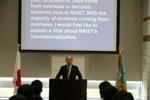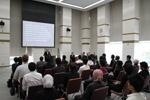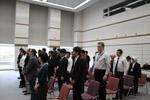2012/10/09
On Tuesday, October 2, 2012, an entrance ceremony was held in the Training Hall in the Center for Frontier Science and Technology.
NAIST eagerly promotes admission of students whether from Japan or overseas with strong basic academic capabilities without being bound to a major field in university as well as researchers, engineers and others currently working actively in society who have clearly defined goals and aspirations for the future as well as strong interest and enthusiasm for research fields. This autumn 35 graduate students were granted admission to NAIST.
President Isogai delivered a welcome speech to the students with a translation in English displayed separately, since many international students were enrolled.
*Number of Enrollees in October
【Master's Course】
Information Science 14 (11 international students)
【Doctoral Course】
Information Science 8 (5 international students)
Biological Sciences 7 (6 international students)
Materials Science 6 (4 international students)
Total 35 (26 international students)
【Congratulatory Remarks to Entering Students by President ISOGAI】
On behalf of all staff and faculty of NAIST, I extend my heartfelt congratulations to all entering students today. 35 students are entering NAIST today, 14 in master's courses and 21 in doctoral courses.
I am pleased to note that 26 of you are international students who have boldly chosen to study in Japan, away from your home countries.
NAIST was established in 1991 in a corner of Kansai Science City as a national university composed solely of graduate schools. Our university's core objectives have always been "promoting advanced scientific research" and "developing human resources through advanced education based on our research accomplishments" in order to "contribute to the development of society and of science and technology."
For the past two decades the faculty and staff have strived to achieve the objectives originally set forth in the university's mission and the results of this dedication are reflected in our high evaluation among national universities.
Furthermore, government data clearly shows that the quality of our research in the areas of information sciences, foundational life sciences and chemical/material sciences is extremely high.
In addition, NAIST's educational system, based on its top class research, has been evaluated highly as a new graduate school education system. To date, we have had 5560 graduates from our master's programs and 1096 from doctoral programs.
I hope you take pride in entering a university of such prominence.
Of the 35 students entering our school today, more than half of you, 26 students, have come from overseas to become students here at NAIST. With the majority of students coming from overseas, I would first like to explain a little about NAIST's internationalization.
As I said before, NAIST has been recognized among Japanese universities for creating a new graduate school research and education system in Japan.
The next step for us was the internationalization of NAIST, and we have strived to achieve an educational system of international standards and recruit talented international students.
As a result, the number of international students enrolled at NAIST increased from 50 in the early 2000's to 146 students today, which is over ten percent of the total student population.
Furthermore, international students make up more than twenty percent of the current doctoral student population.
To date, 248 degrees have been conferred to international students in total, 135 master's degrees and 113 doctoral degrees.
I would like to take this opportunity to take a fresh look at the internationalization of Japanese universities.
I believe the internationalization of Japanese universities involves opening them up to the world, which includes accepting students from around the world and cultivating human resources that will be active in today's global society.
In addition to this, international students coming to Japan will develop an understanding of Japanese society and culture, making many Japanese friends along the way.
And at the same time, Japanese students will come to understand and become active in the global society.
For this, Japanese and international students from around the world must come together and interact to develop an international understanding of their own countries while coming to comprehend the diversity of cultures among their peers.
I believe this is the first step toward internationalization.
I hope that all of you sitting before me strive to become excellent scientists and researchers and, at the same time, internationally-minded individuals.
With this in mind, in addition to developing this international perspective, there are a few points that I would like to ask of you as you carry out your studies here at NAIST.
(1) First of all, read many books and think for yourself. Knowledge attained through careful thought is true knowledge. Knowledge is not simply to be found on hard disks or in computer memory.
This true knowledge will become your flesh and blood, and will be useful for the rest of your life. This self-attainment of knowledge is the essence of education.
The changes you will go through during this process represent your growth and development as a person.
(2) Convey and receive accurate information.
In today's internet-oriented society we are flooded with massive amounts of conflicting information. I hope you attain the knowledge necessary to keep your head above water in this vast ocean of information.
In order to do this you need the ability to determine what is correct and what is not. You must also realize that you undertake responsibility whenever you convey information.
(3) Become familiar with the nature that surrounds you. After all, the desire to understand nature is the origin of philosophy and science.
Western natural science started out believing that nature was the product of God's power and was thus the search to understand it. There is still much unknown about nature and in it you may find the focus of your research.
At the same time, in keeping with the Eastern spirit, I hope you also come to have a fear of the power of nature, for humans still are not able to fully control its power.
(4) Interact with people. Please avoid the urge to distance yourself from others; make new friends and find good mentors. In finding each friend and mentor, you will have found a lifelong treasure.
When communicating with others, try to do it face-to-face, for this will give you much more insight and information than email, etc.
(5) Think about yourself in society. Now, that the relationship between society and science is stronger than ever, it is important to realize your responsibility as a scientist.
Also understand that before you are a scientist, you are first and foremost a member of society.
(6) Familiarize yourself with the culture of Nara and Japan. Nara was once a leading city of the arts and science, and much of Japan's heritage can still be found here.
To the international students; please acquire an understanding of Japanese culture. This is one of the bonuses of having come to Nara.
For the Japanese students, I hope you cultivate an active interest in Japanese historical culture and are able to talk about it as you interact in today's global society. Culture is as important to mankind as science.
(7) Maintain interest in all areas of science, not only your own research focus.
Please acquire a wide range of knowledge in many different areas so as to be considered a well-rounded scientist. This includes learning about the ethos of science.
The ethos of science is not just written knowledge, but also things such as thinking and reasoning, knowledge from experience, understood but unwritten rules, and scientific morality. The ethos of science is the culture of science itself.
(8) Become fluent in English. English is the language of international communication and the language of global academic exchange.
English is a necessary tool to be globally active and I hope you achieve a high level of English communication skills. To achieve this, trying to use English everyday is very important.
For Japanese students, please do your best to form lasting relationships with international students, and for international students, I hope you will study Japanese. This is necessary for your life in Japan and to understand Japanese culture.
(9) Maintain mental and physical health. This is the most important in order to continue and enjoy your lives here at NAIST.
If you have anxiety or stress please try to remember your original intentions, such as why you came to this school.
The nine points I just mentioned are actually what I asked of students at the first entrance ceremony after I became president.
Six months from now I will complete my final term in this position, so you are the last students I will greet. I, too, will try to return to my original intentions, keeping in mind what I have told you today.
With the earthquake and nuclear disaster on March 11th of last year, science is facing a new, enormous challenge concerning our future energy supply. In fact, this problem exists on a global scale.
Along with this, there are also very difficult issues such as global environmental problems, water and food supply, and the north-south divide.
The methods of attaining knowledge you will learn at NAIST will surely be useful in your future as you work to tackle the difficult challenges that await.
I hope that during your rigorous studies here, you will have an enjoyable student life while developing into scientists and researchers who are prepared to contribute all over the world.
Congratulations.
Akira Isogai
President, Nara Institute of Science and Technology
October 2, 2012







